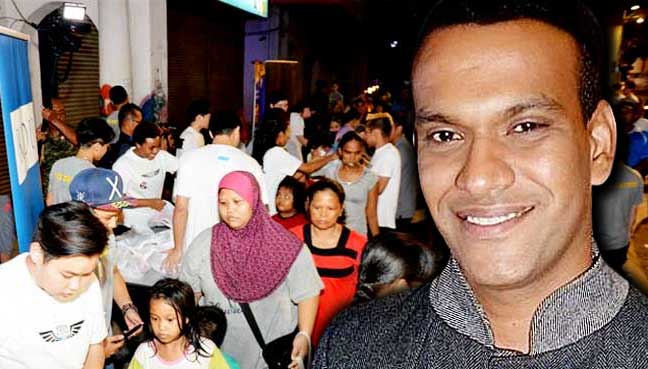PETALING JAYA: Several NGOs are trying to reduce food wastage this Ramadan by trimming the portions of food being distributed to the homeless.
Institute Onn Ja’afar (IOJ) CEO Charles Mohan said big portions were one of the main reasons for food wastage, adding that homeless people often received such amounts from different NGOs on the same day.
He said in order to reduce wastage, IOJ had downsized its portions and changed the type of food it offered the homeless, handing out biscuits and mineral water.
Rina Shaharuddin from Need to Feed the Need (NFN) said her NGO had managed to reduce the amount of wastage by halving the portions they normally offer to the homeless.
She added that the different NGOs were all aware of each other’s activities, which made it easier to estimate the amount of food to distribute.
“If the individuals and companies that want to feed the homeless during Ramadan work with us or other NGOs, perhaps the amount of food wastage can be reduced even more,” she said to FMT.
Kogeelan Pall, chairman and founder of Persatuan Kebajikan iCareBearz, said food wastage had been rampant ever since the Kuala Lumpur City Hall (DBKL) announced its plan to ban homeless feeding.
“Ever since that announcement, more people have started coming to the streets to give out food, which leads to food wastage,” he told FMT.
“It becomes worse during festive seasons such as Ramadan, Chinese New Year, Christmas or Deepavali, as Malaysians seem to be more charitable during these periods.”
He added that street feeders had been working on trying to minimise food wastage for the past two years.
Jennifer Chua, co-founder of Happy Caring Hearts Crews, agreed that food wastage was due to the increase in public awareness, especially after the DBKL announcement.
She told FMT that other factors included university students feeding the homeless as part of their community projects.
Multiple NGOs aiming for the same spot also contributes to food wastage in the area.
For example, the Tune Hotel along Jalan Tuanku Abdul Rahman and near Jalan Chow Kit is a hot spot for homeless feeding.
For this reason, Robin Hood Army chooses to distribute food near Pasar Seni, opposite Bangkok Bank, instead.
“There is no food wastage (here). In fact, there is a lack of food to be given,” said Kim Chang, who is the chapter leader of the NGO’s Kuala Lumpur branch.
Chang said the area was quiet compared with other hot spot locations, adding that the NGO works with restaurants in providing the food, which allows it to fix the amount distributed to the homeless.
Other approaches to reducing food wastage
Other NGOs are trying different methods of preventing food wastage.
Feed The Needy, for instance, offers free haircuts in addition to providing food.
Meanwhile, The Travellers puts a hold on feeding the homeless during Ramadan. Instead, it delivers food supplies to asnaf, those who are eligible to receive zakat or alms, and muallaf, those who are newly-converted to Islam.
Erin Ratna, vice-president of Kindness Malaysia, said the organisation takes a month’s break during Ramadan to allow other NGOs and members of the public to feed the homeless.
She suggested that members of the public who are interested in helping the homeless give them dry food such as biscuits which will last longer.
Munira Abdul Hamid, chairperson of Pertiwi Kitchen, said those who wished to help should reach out to NGOs so that proper planning could be done on the amount of food distributed.
“The public needs to understand the main objective of feeding the homeless. That way, we can help them out,” she said to FMT.
She said the NGOs are doing more than just feeding the homeless, and are trying their best to understand the situation and the needs involved before offering their help and holding further discussions with the government.
“We, the NGOs, talk to the homeless and find out the reasons they are homeless and provide them with what they need,” she said.
1.3 billion tonnes of food wasted globally every year
The United Nation’s Food and Agriculture Organisation (FAO) estimates that 1.3 billion tonnes of food is wasted globally every year.
Organisations in most countries are working to reduce that amount.
For example, Hayati’s Food Aid Foundation in Malaysia works to salvage and redistribute food that would have otherwise been thrown away.
The NGO collects unserved dishes from hotels, and bread and canned food from supermarkets and other places to distribute to charities and soup kitchens.
However, food is still ending up in Malaysia’s landfills. Many NGOs add that they have seen homeless people sleeping beside piles of untouched food.
This also raises concerns over cleanliness, as the NGOs are worried that food wastage will contribute to unhygienic living areas for the homeless.
Last month, the Solid Waste And Public Cleansing Management Corporation (SWCorp) estimated that 200,000 tonnes of food – enough to feed 180 million people – was thrown away.
According to Hayati Food Aid Foundation, the main cause of food wastage comes from domestic waste and Ramadan bazaars.
Although the amount of food wastage has gone down this year compared with previous years, it remains a problem.
NGOs are urging members of the public to visit the NGOHub website for information on feeding the homeless with NGOs instead of going at it alone.
NGOHub has been helping the organisations compile and map the activities of street feeders for public reference and to aid the NGOs in reducing food wastage.
Source : 13 JUNE 2017 Free Malaysia Today
http://www.freemalaysiatoday.com/category/nation/2017/06/13/feeding-the-homeless-how-to-reduce-food-wastage/




